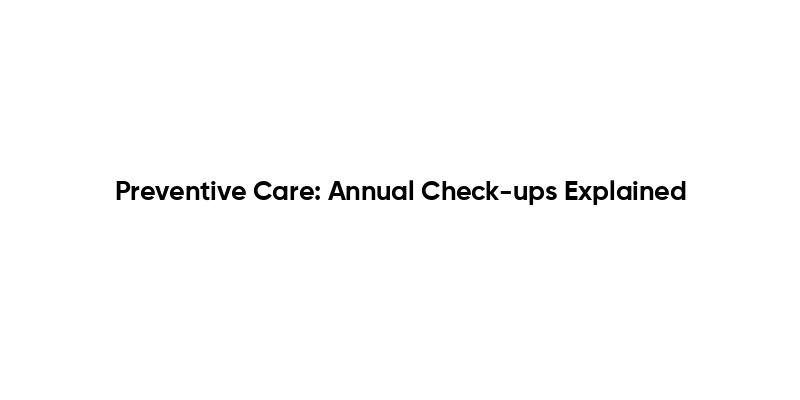Preventive care is a crucial aspect of maintaining overall health, and annual check-ups play a significant role in this process. These routine examinations are designed to catch potential health issues before they become serious, ensuring that you stay on top of your well-being. In this article, we will delve into the importance of preventive care and how annual check-ups can help you lead a healthier life. By understanding the benefits of these assessments, you can take proactive steps towards a better future.
As we explore the topic of preventive care, you will learn about the various components of an annual check-up, including essential screenings, vaccinations, and lifestyle assessments. We will discuss how these evaluations can identify risk factors and provide personalized recommendations tailored to your unique health needs. Additionally, we will highlight the significance of establishing a strong relationship with your healthcare provider, which can enhance the effectiveness of your preventive care strategy.
By the end of this article, you will have a comprehensive understanding of why annual check-ups are not just a formality but a vital investment in your health. We encourage you to continue reading to discover how these preventive measures can empower you to take charge of your health and well-being. Don’t miss out on the opportunity to learn how simple, regular check-ups can lead to a longer, healthier life!
Importance of Annual Check-ups
Annual check-ups are a crucial component of preventive care, serving as a proactive approach to maintaining health and well-being. These routine visits allow healthcare providers to assess an individual’s overall health, identify potential health issues early, and implement preventive measures. Regular check-ups can lead to early detection of conditions such as hypertension, diabetes, and certain cancers, significantly improving treatment outcomes.
Moreover, annual check-ups provide an opportunity for patients to discuss any health concerns with their doctors. This open dialogue can lead to personalized health advice, lifestyle modifications, and vaccinations that are essential for disease prevention. By prioritizing annual check-ups, individuals can take charge of their health and reduce the risk of serious health complications in the future.
What to Expect During an Annual Check-up
During an annual check-up, patients can expect a comprehensive evaluation that typically includes a physical examination, medical history review, and various screenings. The healthcare provider will assess vital signs such as blood pressure, heart rate, and temperature, which are essential indicators of health status. Depending on age, gender, and risk factors, additional tests may be recommended, including blood tests, cholesterol screenings, and cancer screenings.
Patients should also be prepared to discuss their lifestyle habits, including diet, exercise, and substance use. This information helps healthcare providers tailor their recommendations and interventions. Understanding what to expect during an annual check-up can alleviate anxiety and encourage individuals to prioritize these essential visits.
Preventive Screenings and Vaccinations
Preventive screenings and vaccinations are integral parts of annual check-ups. Screenings for conditions such as high cholesterol, diabetes, and certain cancers can help identify risks before they develop into more serious issues. For example, mammograms and colonoscopies are recommended at specific ages to detect early signs of cancer, while blood tests can reveal underlying health problems.
Vaccinations are equally important, as they protect against various infectious diseases. Annual flu shots, for instance, are recommended for everyone, while other vaccines may be necessary based on age and health history. Staying up-to-date with vaccinations not only protects individual health but also contributes to community immunity.
Cost and Accessibility of Annual Check-ups
The cost of annual check-ups can vary widely depending on insurance coverage, location, and the specific services provided. Many health insurance plans cover preventive services at no additional cost, making it more accessible for individuals to prioritize their health. However, those without insurance may face barriers to accessing these essential services.
To improve accessibility, many healthcare providers offer sliding scale fees or community health programs that provide low-cost or free check-ups. It is essential for individuals to explore their options and understand their insurance benefits to ensure they can take advantage of preventive care services.
Building a Relationship with Your Healthcare Provider
Establishing a strong relationship with a healthcare provider is vital for effective preventive care. Annual check-ups provide an opportunity to build trust and open communication, allowing patients to feel comfortable discussing their health concerns. A good relationship can lead to better health outcomes, as patients are more likely to follow medical advice and engage in preventive measures.
Moreover, a healthcare provider who knows a patient’s medical history and lifestyle can offer personalized recommendations that align with their unique needs. This tailored approach enhances the effectiveness of preventive care and encourages individuals to take an active role in their health management.
Annual check-ups are a vital component of preventive care, aimed at maintaining health and preventing diseases. This summary provides an overview of the importance, components, and benefits of annual check-ups.
| Aspect | Description |
|---|---|
| Definition | An annual check-up is a routine medical examination performed by a healthcare provider to assess an individual’s overall health. |
| Purpose | The primary purpose is to detect potential health issues early, provide vaccinations, and promote healthy lifestyle choices. |
| Components |
|
| Benefits |
|
| Frequency | Most adults should have an annual check-up, while children may require more frequent visits based on age and health needs. |
| Conclusion | Regular annual check-ups are essential for maintaining health, preventing illness, and ensuring a better quality of life. |




